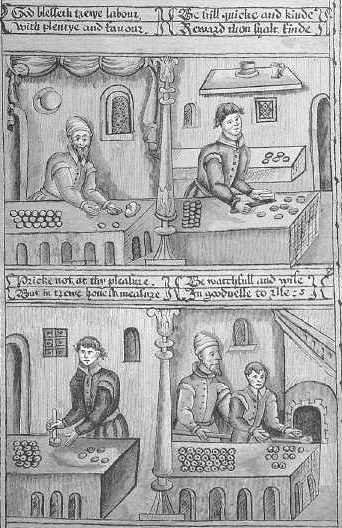Bakers
Statutes, dating from the time of Edward VI, strictly regulated trade; as a result, the economy of England was not by any means "free market." The price and weight of bread was rigorously controlled by local authorities. The price and weight of bread was rigorously controlled by local authorities, according to the cost of wheat in different years. Jack Cade was being only slightly absurd when he claimed that he would proclaim that "there shall be in England seven halfpenny loaves sold for a penny" (Henry VI, Part Two, 4.2.66-67).
Click here for the moral* written in the illustration.
A recipe for bread
Of baking manchets [white loaves]
"Now for the baking of bread of your simple meals, your best and principal bread is manchet, which you shall bake in this manner; first your meal, being ground upon the black stones if it be possible, which makes the whitest flour, and bolted [sifted] through the finest bolting cloth, you shall put it into a clean kimnel [tub], and, opening the flour hollow in the midst, put into it of the best ale barm the quantity of three pints to a bushel of meal, with some salt to season it with.
Then put in your liquor reasonable warm and knead it very well together both with your hands and through the brake; or for want thereof, fold it in a cloth, and with your feet tread it a good space together, then, letting it lie an hour or thereabouts to swell, take it forth and mould it into manchets, round, and flat; scotch [slash] about the waist to give it leave to rise, and prick it with your knife in the top, and so put it into the oven, and bake it with a gentle heat."
The "brake" mentioned above is a device to assist in kneading; see the similar tool used in the preparation of hemp.
Footnotes
-
The morality of baking
Frame 1, kneading the bread
God blesseth true labour
With plenty and favour.
Frame 2, shaping the loaves
Be still quick and kind
Reward thou shalt find,
Frame 3, "pricking" the loaves to allow them to rise.
Prick men at thy pleasure
But in true honest measure.
Frame 4, putting the loaves in the oven
Be watchful and wise
In true goodness to rise.
